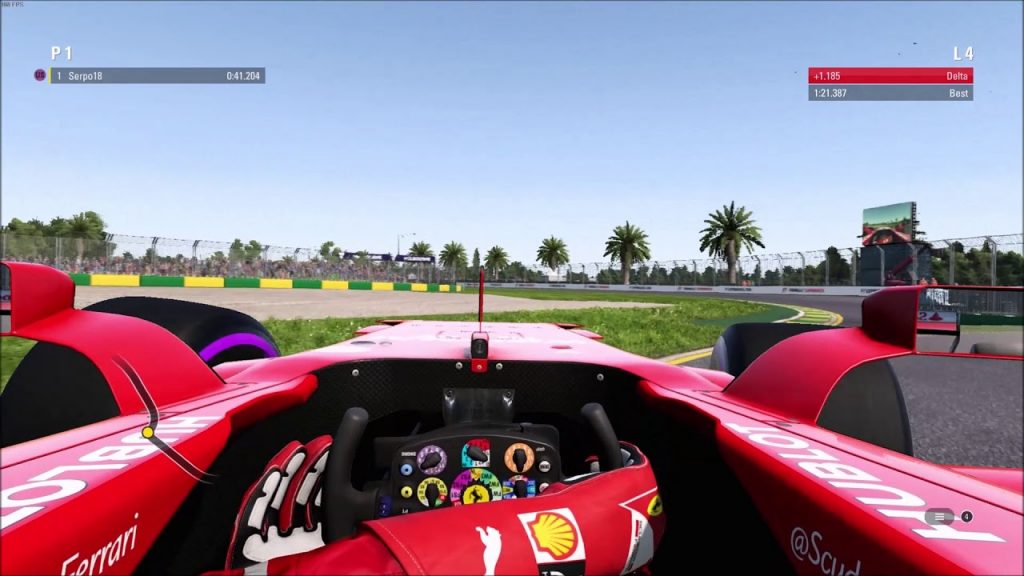
If there is anything that is holding back Codemasters’ Formula One series from truly delivering the best racing experience out there, then it has to be the games’ visual department. Ever since the advent of current generation consoles, there has been an uptick in the series’ graphics fidelity but largely speaking, it’s nowhere close to the likes of Gran Turismo and Forza series. Now, granted there is an argument to made here…both Gran Turismo and Forza have high budgets for each of their entries, and the former receives like two entries per generation, compared to Formula One which is a yearly franchise. So obviously, in case of Formula One the scope to drastically improve each entry is reduced. However, given that it’s the only AAA game that is based on Formula One, Codemasters could do better with the IP as far as visuals are concerned.
However, with F1 2018, the developers seem to have made major strides not only in terms of gameplay mechanics but also in updating EGO Engine 4.0’s support for physical based lighting, texture materials and audio quality. The very first thing which you will notice upon starting your first race will be the impressive improvements to the lighting and atmospheric systems. The stadiums look immaculately detailed as shadows form dynamically and react accordingly in relation to the time of the day. Compared to some of the previous entries in the series, F1 2018 uses a softer looking lighting tech giving the final rendered image a rather smooth look. This effect immediately makes the game standout from F1 2017 as it totally ditches the slightly higher contrasted look and feel of the previous entries.
F1 2018 also seems like the first entry in the series that is fully gracing the physical based rendering pipeline which allows different materials to react accordingly to the intensity of the light falling on them. So, different environmental objects like the metal fencing, tarmac, the track, foliage or even the cars themselves and driver clothes have lighting models that closely resemble to their real-life counterparts. Couple this feature with the improved lighting system, and you have a game that sometimes reels on borderline photorealism at times.
Another minor feature that F1 2018 improves upon is the environmental detail. Tress look fuller thanks to an improved shader model, density of grass looks just about right across all tracks and gravel feel like each individual object instead of some flat texture pack. These improvements when seen from the top camera view during the beginning of race help in delivering a cohesive visual experience.
Next up is the weather system and thanks to the changes we mentioned above, the current system just looks absolutely fantastic. As with previous entries, F1 2018 allows you to change several weather parameters such as specific times, light rain, heavy rain, overcast and more. The physics related to these conditions have most likely not been touched at all given how stable it already was but thanks to the updated lighting framework, speeding down at 200 miles per hour in Canada during rain was nothing short of a phenomenal experience. Also, if you are a fan of Formula One, you just can’t ignore the pleasant sight of heat haze during the starting sequence or the leading car spraying ground water on your helmet? All of this and more adds to the authenticity of the sport.
Another point of improvement is the game’s audio system. The game now uses an overhauled reverb system and is no longer the using positioned system. This allows the player to clearly differentiate the internal sounds from the external ones. Furthermore, the echo and reflection systems have been improved as well, allowing the player to use the sound as an indicator whenever they are driving too close to the gravel or the metal fences.
Among the host of improvements this year, F1 2018 largely falters yet again in its character model and animation department. Now don’t get us wrong, they look better than last year but it’s still not where it should be. The driver characters look alright for the most part but it’s the NPCs that the engine falters in. Our assumption is that animations are at the bottom of the “to improve” list at Codemasters and although we understand why the developers may not have pushed it as per our expectations, it’s still an aspect of the game that can drive ahead the immersion factor.
So, that’s it as far visual improvements are concerned but how does the game fare on the PS4 Pro and Xbox One X? Well, as expected both versions run at 4K resolution but there seems to be a checkerboard implementation on consoles. Both versions target 60fps but during the heavy CPU based sequences like a ton of cars at once along with heavy rain can hit performance on the PS4 Pro. The Xbox One X on the other hand is extremely stable with little to no frame rate drops. We also witnessed screen tearing on both versions but it was more prominent on Sony’s machine. So, overall as far as performance goes, the Xbox One X manages to deliver a better frame rate. Other than the performance differences, the Xbox One X also benefits from better shadow quality but other aspects like object rendering, filtering quality and material quality all remain consistent across both versions. So, as expected Microsoft’s Xbox One X delivers the better deal here but the PS4 Pro version isn’t that far behind.
F1 2018 marks a shift in the franchise’s technical achievements. The latest entry pushes new boundaries in so many little and minor things, but as a whole it all comes together to deliver what is the best looking F1 game of all time. Of course, there are things we want the game improve on and it’s no way close to the behemoths like Forza and Gran Turismo in terms of graphics tech but this first step will go a long way in delivering not only an authentic Formula One racing experience in the future but also a bedazzling one.
















